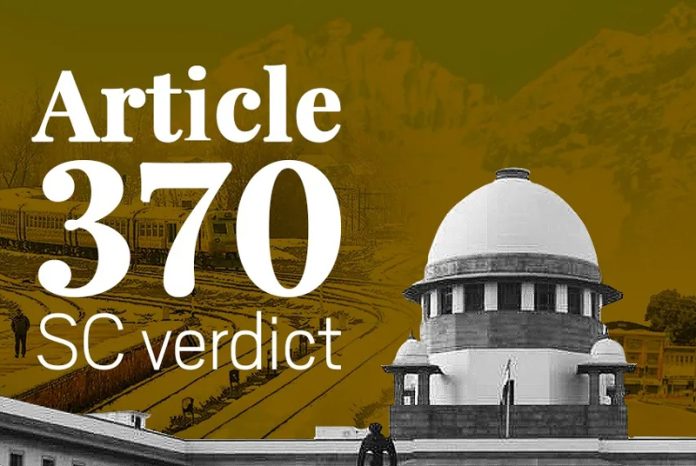The Supreme Court, in a unanimous decision, unequivocally upheld the Central Government’s resolution to annul provisions of Article 370, which conferred special status upon the erstwhile state of Jammu and Kashmir. The apex court issued three concurring judgements affirming the abrogation of constitutional frameworks providing special privileges to J&K upon its integration with India in 1947. The unanimous verdict delivered by a five-judge bench represents the final and definitive closure of the contentious chapter of Article 370 concerning Jammu and Kashmir, thereby extinguishing the spectre of its erstwhile special status. A retrospective examination of history reveals that Jammu and Kashmir was the last state to accede to India while repelling an attempted annexation by the Pakistani army and tribal forces.
The discord and lack of trust between Nehru and Maharaja Hari Singh, as well as between Maharaja Hari Singh and Sheikh Abdullah, engendered a regrettable situation that could have been averted at all costs. The political landscape, tainted by bruised egos, spiralled into a protracted imbroglio, exacting a national toll. Maharaja Hari Singh, unique among state heads, endured enforced exile within his own country but was far removed from his state. Despite the Indian forces maintaining ascendancy during the prolonged conflict, the matter was referred to the UN, leading to subsequent missteps involving the plebiscite and the introduction of Article 370. The ephemeral camaraderie between Nehru and Sheikh Abdullah dissipated swiftly, ensnaring the nation in the labyrinth of Article 370. The perplexing scenario of having two prime ministers within a single country resulted from decisions with far-reaching consequences. Although rectified later, the seeds of independence and secessionism had been sown, subsequently nurtured by the Plebiscite Front and Jamaat-e-Islami.
Constitutional amendments were enacted several times in damage control mode, aimed at integrating Jammu and Kashmir with the rest of the nation. However, political parties persisted in keeping the cauldron of discontent simmering, periodically pushing Jammu and Kashmir to boiling points with no discernible cause beyond inciting trouble under the guise of independence, allegedly on behalf of Pakistan. Simultaneously, radicalization exacerbated the situation, and in the 1980s, the state of Jammu and Kashmir found itself besieged by terrorism. The ensuing events surpassed comprehension, and the Frankenstein of terrorism wreaked havoc. Even those who initially orchestrated this malevolent symphony lost control, leading to the mass exodus of the Kashmiri Pandits to escape the clutches of fundamentalism. Law and order disintegrated, and the macabre dance of death persisted, with successive elected Governments post-1996 failing to curb the separatists.
On August 5, 2019, a historic decision to abrogate Article 370 was taken, and four years after the audacious move by the Modi Government to abrogate Article 370, the Supreme Court has definitively settled the matter. All facts and interpretations of laws were put forth and discussed in depth, and after hearing all parties involved, the Court, in a landmark decision, affirmed the supremacy of presidential powers and categorically deemed Article 370 a transient provision that had served its purpose and must go now. This underscores that decades of arm-twisting under the guise of special status were based on a fallacious premise, with successive Central Governments succumbing to the pressures of separatists and the state Government.
The verdict conclusively puts to rest all speculations. The creation of the Union Territory of Ladakh remains unaltered, and the restoration of statehood to Jammu and Kashmir is contingent upon pragmatic considerations, without a mandated timeline set even by the Supreme Court. National interests, transcending political expediency, take precedence, as the entire nation is acutely cognizant of the protracted challenges faced by the region. The Supreme Court’s timeline of September 30, 2024, for conducting assembly elections is deemed fair and reasonable. Delimitation processes have been meticulously executed, and the central Government has consistently emphasised that elections can be conducted at the discretion of the Election Commission. Yet, the imperative remains to dismantle the ecosystem of terrorism and separatism comprehensively, ensuring that the curse of terrorism never afflicts Jammu and Kashmir again. The lifeline of secessionism has been severed decisively, and the trajectory forward necessitates fortifying nationalist forces within Jammu and Kashmir.
The recurrent cycle of shutdowns and instances of stone-pelting has been meticulously deciphered and effectively addressed. Perpetrators of violence and terrorism are now subjected to the unequivocal enforcement of the rule of law. The residents of Jammu and Kashmir are relishing a newfound sense of freedom devoid of the looming spectre of terrorism. The vital role played by elected representatives, essential pillars of democracy, has been notably accentuated in the past five years, with the establishment of Panchayati Raj effectively filling this critical void.
A robust e-Government system has been meticulously instituted, laying the groundwork for sustained peace and development. All political parties should now redirect their focus towards the democratic process, unlike earlier elections boycotted by a few local parties. Ample opportunities will be there to establish political supremacy. The forthcoming days are poised to witness a resurgence of political activities, with citizens poised to exercise their inherent right to choose their representatives. This singular verdict conclusively dispels all conjectures, affirming that Jammu and Kashmir now stand seamlessly integrated with the broader national fabric, akin to other states in the union. The inexorable march of time precludes any attempts to reverse its course. The collective focus should now pivot towards progress and development for Jammu and Kashmir. All political entities must coalesce to achieve this common objective, recognising that national interests must never be sacrificed on the altar of regional politics. While history has been inscribed, the onus now rests on securing a future marked by stability and prosperity for the region.
Trending Now
E-Paper


